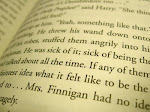
If you can believe me (and I hope you can), I first read this book in FIFTH grade- way before I knew what it was really all about. Still, I got the impression that it had a deeper meaning than just on the surface. Now, after reading it several times, I have a much better grasp of its theme and what the main character, Holden Caulfield, stands for.
Holden is a young man who's just been expelled from a fancy prep school for a poor academic record. Unwilling to come home early and talk to his parents about it, he kills time in New York City until he's due to go back home. This novel is a record of those three days, including a fight with his roommate just before leaving, a night spent with three tourists girls at a club, an awkward encounter with a prostitute, and a humorous drunken episode. Throughout the book, Holden describes the people he came into contact with at Pencey and even some of the girls he's been out with as "phony"; he also embodies the confusion and angst many teenagers go through, making him one of the best-known characters in American literature.
However, because of his excessive swearing and rebellious attitude, this book has been through the wringer in terms of censorship. According to Wikipedia, between the years 1961 and 1982 The Catcher in the Rye was the most censored book in high schools and libraries in the United States. The use of profane language, sexual references, blasphemy and Holden's "being a poor role model" are just a few of the reasons. I admit that during the time it was written, people likely had never read such words in print before; my first time reading it I remember hiding it from my mom because I was worried she would take it away. However, without all of this language and references, how else was the author going to create a credible, honest character? I also have to object at some of the other reasons. I don't believe Holden was ever truly meant to be a role model; rather, he is more of a character that teens can relate to, and whom they can see in themselves. The way I've interpreted it, he may also be the kind of character Salinger created to show adults their own faults, with the suggestion being that youth rebels because it doesn't find any truth in those who are meant to show it to them. In fact, one of the youngest characters in the novel other than Holden- his kid sister Phoebe- is the one whom Holden reveres as a hero. Not every novel is written with a clear, noble hero in mind; often the protagonists with the most faults can teach us the most about life, the world and ourselves. If creating a fallible character is blasphemy... well, every novelist is in danger of hellfire- and most of the human population, for that matter.
At any rate, read this book if you haven't already, because it is definitely a great one. The late Salinger has written a classic which teens and adults alike should read and hold dear, and many authors themselves have paid homage to.










